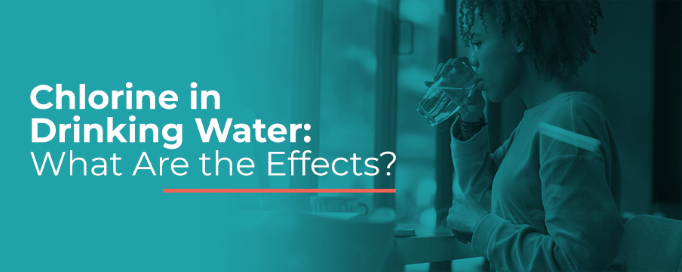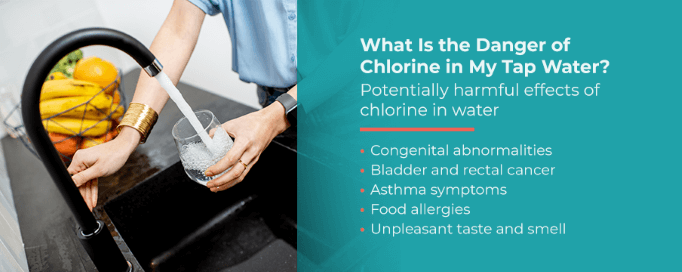
Water is a vital part of our lives — especially the tap water that comes into our homes. The majority of Americans — 71% of us — drink tap water at least sometimes, if not regularly. If we don’t drink it, we at least use it for bathing, laundry, and cleaning. The majority of Americans also worry about their water quality. A recent Gallup poll shows that the U.S. population is more concerned about water quality than it has been since 2017, with 63% of Americans reporting that they “worry a great deal” about polluted drinking water.
Recent water crises, such as the lead contamination in Flint, Michigan, may be at the forefront of people’s minds when they think about their water quality. But lower-profile contaminants in drinking water, such as chlorine, can be an issue as well.
Is drinking chlorine harmful? Drinking water that contains chlorine will not hurt you immediately, but it may have long-term health effects. Below, we’ll discuss some of the effects of chlorine consumption and suggest some ways you can avoid having too much chlorine in your water.
Is Chlorine in My Drinking Water Dangerous?
At the concentrations found in drinking water, chlorine is nontoxic to humans. Many municipalities add chlorine to their water to help kill harmful organisms such as viruses and bacteria that could make us sick if we ingested them. This disinfecting ability is also why swimming pool facilities add chlorine to their water.
People started adding chlorine to water as early as the 1800s, when they realized it had disinfectant properties. During that time, when water went untreated, it was common for people to contract waterborne diseases such as cholera, typhoid, and dysentery. The initial introduction of chlorine as a disinfectant helped to lower disease rates and keep city-dwellers safe.
We now know there are other ways to treat bacteria in water, such as with an Ultraviolet Light (commonly used by homeowners with well water). However, chlorine treatment is still the most cost-effective option for large-scale treatment, so the practice of municipalities adding chlorine to water to kill microorganisms persists. Chloramine, a “chemical cousin of chorine”, is also used by some municipalities and produces its own negative effects.
Even though diluted chlorine is non-toxic, it can still have harmful effects, which we’ll discuss below. Additionally, chlorine treatment does not guarantee that drinking water contains zero harmful microorganisms — some may develop resistance to chlorine treatment.
What Is the Danger of Chlorine in My Tap Water?

Ingesting chlorine with your tap water can have a number of adverse health effects. Some of these effects occur because chlorine tends to form trihalomethanes. Trihalomethanes (THMs), including chloroform, form when chlorine reacts with tiny organic particles found in water. These chemical compounds have been implicated in several adverse health outcomes. Below are some of the potentially harmful effects of chlorine water:
- Asthma symptoms: One study suggests that exposure to chlorine in swimming pools is associated with increased exercise-induced asthma symptoms in swimmers, even if the swimmers have had no previous asthma symptoms, and even if the chlorine levels in the pool are below the recommended safe levels. When you bathe or shower in chlorinated water, you also absorb chlorine through your skin and breathe in chlorinated steam. If you experience respiratory problems, breathing in chlorine can aggravate the symptoms.
- Food allergies: One recent study analyzed the effects of dichlorophenols, which are used both in pesticides and in water chlorination. The study found that participants with the highest levels of dichlorophenols in their bodies were more likely to have the most food allergies. This study focused on dichlorophenols in pesticides, though — not in chlorinated water, though the effects may be similar.
- Congenital abnormalities: A Taiwanese study of nearly 400,000 individuals found that women who were exposed to trihalomethanes in chlorinated water while pregnant were more likely to give birth to children with one of three different birth abnormalities: cleft palates, ventricular septal defects — or holes in the heart — and lack of brain development.
- Bladder and rectal cancer: A 1995 study published in Environmental Health Perspectives implicated the THM byproducts of water chlorination in bladder and rectal cancer — potentially accounting for 8,000 cases of rectal cancer and 5,000 cases of bladder cancer in the United States every year. Some subsequent studies have found a slight link between chlorine and carcinogenic effects, but other studies have found no link. More research on the subject is necessary.
- Unpleasant taste and smell: Even if chlorine levels in your drinking water are safe, the chlorine can still impart a bad taste or smell. When your water tastes or smells bad, you’ll probably be less enthusiastic about drinking it, and drinking too little water can lead to dehydration. When your water is unpleasant to drink, you and your family are also more likely to consume less healthful beverages, such as sodas, or to purchase bottled water, which has its own drawbacks.
How to Remove Chlorine From Drinking Water
One of the best ways to remove chlorine from your home’s water and prevent chlorine side effects is to use carbon. The latest technology allows carbon to bind effectively to chlorine to prevent it from entering your home. Using carbon in a Water Refiner, a whole-house filtration system, and/or a drinking water system can help to ensure that you and your family get to drink and bath with fresh, clean, great-tasting chlorine-free water every day.
Water Refiners for City and Public Water
If you have hard water that contains chlorine, EcoWater’s Water Refiner may be the best choice for your home. The Water Refiner represents the latest advance in water softeners as it softens hard water while also removing chlorine and other impurities. Chlorine is removed using a layer of high-quality coconut shell carbon, which binds to and removes chlorine, eliminating the expense and hassle of changing filters every few months while protecting the Refiner’s expensive resin beads. These benefits make the Refining System an ideal choice for homeowners with hard public water.
EcoWater Water Refiners also connect directly to the EcoWater app, giving our customers a convenient way to monitor their systems. Through the app, you can receive system alerts, monitor your household’s water consumption, and keep an eye on how your Refiner is functioning. This Refiner also uses half the salt of other water softening systems.
Contact Long’s EcoWater for Whole-Home Filtration Options
When you need a Water Refiner, carbon filter, or drinking water system to improve the quality of your home water supply in the Lehigh Valley, turn to Long’s EcoWater. We are experts in the water business, and you can come to us with all your water needs or concerns. Whether you want to soften your water to make your skin and hair feel better, are concerned about heavy metals or want to avoid the side effects of chlorine in water, we have a drinking water system or water treatment system that can help you get the clean, refreshing hydration you crave.
Contact us today to learn more.

